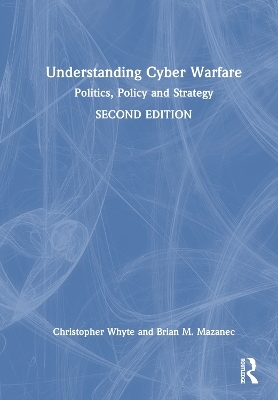
Understanding Cyber-Warfare
Routledge (Verlag)
978-1-032-15939-3 (ISBN)
This textbook offers an accessible introduction to the historical, technical, and strategic context of global cyber conflict. The second edition has been revised and updated throughout, with three new chapters.
Cyber warfare involves issues of doctrine, strategy, policy, international relations (IR) and operational practice associated with computer network attack, computer network exploitation and computer network defense. However, it is conducted within complex sociopolitical settings alongside related forms of digital contestation. This book provides students with a comprehensive perspective on the technical, strategic and policy issues associated with cyber conflict, as well as an introduction to key state and non-state actors.
Specifically, the book provides a comprehensive overview of several key issue areas:
The historical context of the emergence and evolution of cyber warfare, including the basic characteristics and methods of computer network attack, exploitation and defense
An interdisciplinary set of theoretical perspectives on conflict in the digital age from the point of view of the fields of IR, security studies, psychology and science, technology and society (STS) studies
Current national perspectives, policies, doctrines and strategies relevant to cyber warfare
An examination of key challenges in international law, norm development and deterrence; and
The role of emerging information technologies like artificial intelligence and quantum computing in shaping the dynamics of global cyber conflict
This textbook will be essential reading for students of cybersecurity/cyber conflict and information warfare, and highly recommended for students of intelligence studies, security and strategic studies, defense policy, and IR in general.
Christopher Whyte is an assistant professor in the program on Homeland Security & Emergency Preparedness at the L. Douglas Wilder School of Government & Public Affairs, Virginia Commonwealth University. He is co-editor of Information Warfare in the Age of Cyber Conflict (2020) and co-author of Information at War (2022). Brian M. Mazanec is an adjunct professor in the Defense and Strategic Studies program at Missouri State University and a senior executive with the U.S. government. He is author of The Evolution of Cyber War (2015), co-author of Deterring Cyber Warfare (2014) and co-editor of Information Warfare in the Age of Cyber Conflict (2020).
1. Introduction 2. The Technological Foundations of Insecurity in the Digital Age 3. Cyberspace and International Relations 4. Exploit: From Signals Intelligence to Cyber Warriors 5. Attack: From Exploitation to Offensive Cyber Operations 6. Shape: Subvert, Deceive, Poison 7. The Topology and History of Major Cyber Conflict Episodes 8. National Experiences with Cyber-Security: Realization and Institutional Development 9. States at Cyberwar: The Dynamics and National Strategies of Cyber Conflict 10. Cyber Conflict as ‘Grey Zone’ Conflict 11. Non-State Actors: Terrorism, Subversion and Activism Online 12. Norms, Ethics and International Law for Offensive Cyber Operations 13. Evolution: How the Logics of Cyber Conflict Might Change 14. Revolution: How the Nature of Cyber Conflict Might Change
| Erscheinungsdatum | 03.04.2023 |
|---|---|
| Zusatzinfo | 3 Tables, black and white; 20 Line drawings, black and white; 20 Illustrations, black and white |
| Verlagsort | London |
| Sprache | englisch |
| Maße | 174 x 246 mm |
| Gewicht | 1510 g |
| Themenwelt | Sozialwissenschaften ► Politik / Verwaltung ► Europäische / Internationale Politik |
| ISBN-10 | 1-032-15939-1 / 1032159391 |
| ISBN-13 | 978-1-032-15939-3 / 9781032159393 |
| Zustand | Neuware |
| Informationen gemäß Produktsicherheitsverordnung (GPSR) | |
| Haben Sie eine Frage zum Produkt? |
aus dem Bereich


